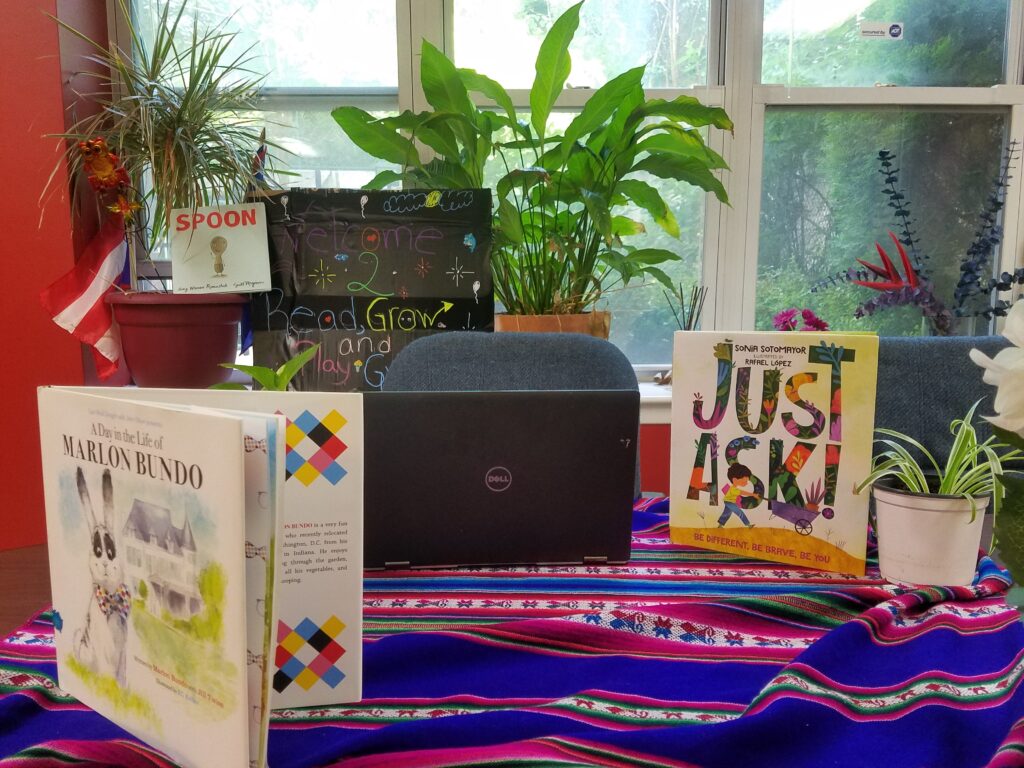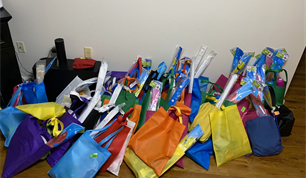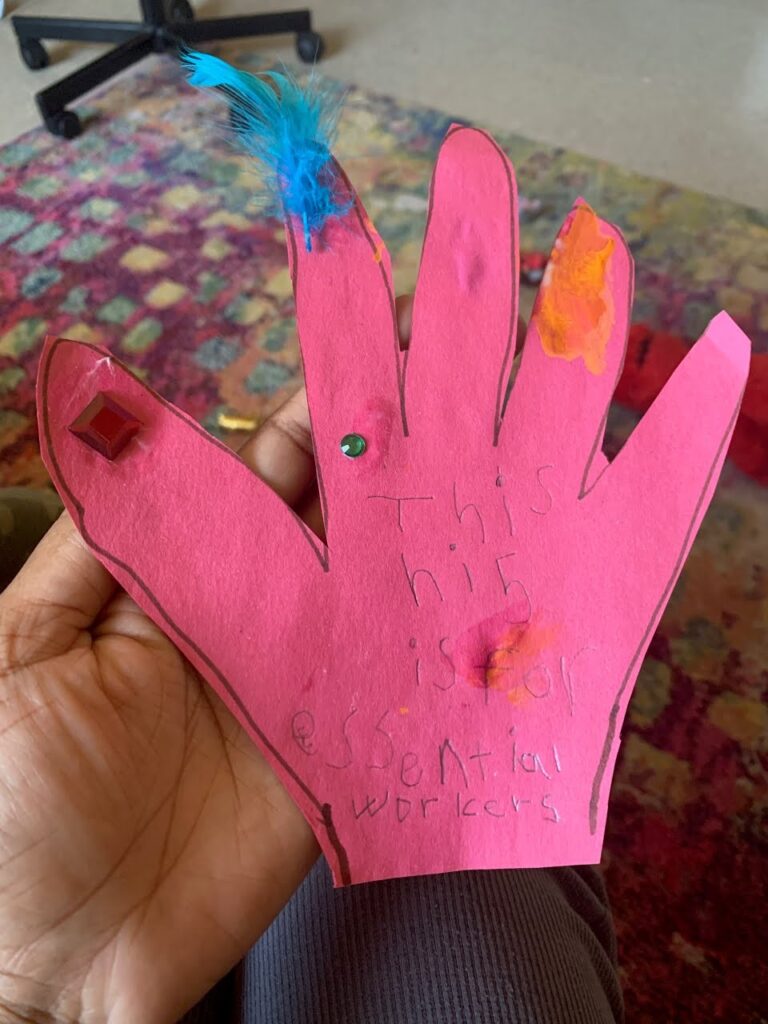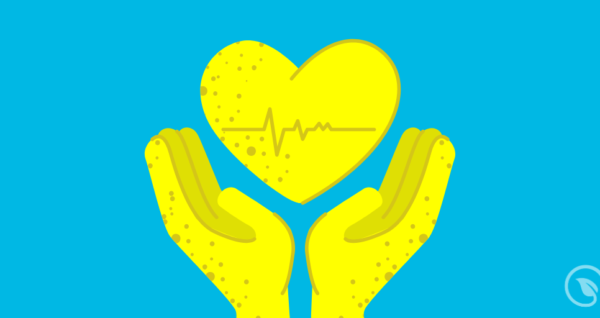By: Cristian Eduardo, Survivor Leader & Shobana Powell, LCSW, Director of Survivor Leadership at Sanctuary for Families
—
Disclaimer: Please note this article may be triggering as it goes into detail about the coercive tactics of traffickers. The purpose of this is to empower survivors and service providers with psychoeducation on how COVID-19 might be particularly triggering for survivors of human trafficking, but we acknowledge that this information might be challenging to read for some. It is written for survivors of sex trafficking who are no longer being trafficked. This guide was written by a survivor of sex and labor trafficking and a licensed mental health clinician.
Click here to download this guide in PDF.
It’s okay to feel how you feel
It is important to talk about how trauma can manifest in different ways, and there is no shame, blame or guilt for being triggered by the COVID-19 pandemic. If you are feeling this way, know that you are not alone. Many survivors are feeling similarly. It is ok if you can identify with any of these feelings. In many ways, it makes sense after the experiences you have lived through
Why might COVID-19 feel particularly triggering or activating for survivors of human trafficking?
Psychological coercion is a powerful form of psychological abuse that can be used to create an environment of fear. The ever-changing nature of how our communities respond to COVID-19 can mirror the psychological coercion tactics utilized by traffickers. Many survivors of trafficking felt they could not exit their trafficking situation due to emotional, financial, and psychological barriers, as opposed to physical ones. As Judith Herman states in her book Trauma and Recovery, “Physical barriers to escape are rare. In most homes, even the most oppressive, there are no bars on the windows, no barbed wire fences… The barriers to escape are generally invisible. They are nonetheless extremely powerful.” The invisible barriers of social distancing can feel similar to those similar invisible restrictions placed on survivors when they were trafficked.
8 Methods of Psychological Coercion
Research has shown that traffickers often use tactics of psychological coercion similar to those used to elicit false confessions from prisoners of war: isolation, disconnection and distrust, debilitation and exhaustion, threats, moments of hope, intimidation, humiliation and emotional abuse, and unpredictable expectations. Below, we will outline how social distancing and our current climate with COVID-19 may remind survivors of feelings and experiences of power and control when they were being exploited.
1. Isolation
Isolation involves cutting off or restricting contact from family members and friends. It can also consist of control over your physical, emotional and digital movement and connections, such as monitoring and restricting your transportation, access to your workplace, your phone, etc.
How does COVID-19 mirror Isolation?
With social distancing, you are kept physically away from your support network. You might also lack full control over your transportation, such as where you are allowed to go and how long you can stay. For some, a safe space you once had access to may no longer be accessible. For example, due to social distancing, many survivors can no longer access a family member, friend or community organization that felt safe. The sense of isolation many of us are feeling due to social distancing does not come close to comparing to the level of isolation most survivors have experienced. However, it can remind survivors of how it felt when they were being trafficked, and if you are feeling that way, it is valid and makes perfect sense after all you have overcome.
Tips on Coping with Isolation
Stay connected virtually in the safest and most comfortable way that you can, whether that might be text, phone call, social media, videoconference, etc.
- Why videoconferencing might be triggering: Please note that videoconferencing itself may be triggering for many survivors of trafficking, especially if the sexual exploitation involved cameras and/or online chat rooms. We advise service providers to be mindful of this and give survivors choice in how they connect with you virtually. We also recommend service providers do not videoconference from their bed. Videoconferencing from a bedroom setting can be especially triggering for survivors under any circumstances, but especially when interacting with an individual in a role of power, as in the past many survivors were exploited by those with power in a bedroom setting. It is important for service providers to be mindful of their power.
- Why certain camera angles might be triggering: Be mindful of the angle at which a survivor might be viewing you if you are videoconferencing. For example, when your device is below you, it can look like a survivor is looking at you from your lap, which can be extremely triggering for survivors of sex trafficking and other forms of sexual violence. Instead, we recommend positioning your camera a few inches higher than eye level, facing slightly down towards you.
- Why phone calls, texts and social media might be triggering: Many survivors had to interact with sex buyers over the phone, text, or social media so even telephone communication and texting can be triggering. Again, we advise that the power to decide what type of virtual communication you use during this time lies with the survivor.
2. Controlling Understanding of Reality
Traffickers often make themselves the single source of information and connection to the outside world, which further enhances their power in the relationship. Traffickers also often blame survivors for their own exploitation and abuse. They also often constantly call, text, email and social media the survivors to maintain even a virtual presence and power in their life. It can feel like you have no escape from the trafficker.
How does COVID-19 mirror Disconnection and Distrust?
With social distancing, it can feel like our only sources of information is the news and our virtual platforms. This can feel similar to trafficking in that we are expected to trust sources outside of ourselves for information. This can be particularly challenging for survivors of trafficking whose trust has often been broken by their primary source of information, namely their exploiters. With social distancing, we can also feel inundated and overwhelmed by the constant bombardment of information via text, phone calls, email, and social media. It can similarly feel like you have no escape from what others want us to hear, see and think about. For some, it can feel like once again, others are controlling you and what you are exposed to.
Tips on Coping with Disconnection and Distrust
- Trusted Sources: Use trusted sources of information, especially those from trauma-informed organizations who have in mind the impact of the information they share.
- Assert Your Power: Create a Routine: If you feel overwhelmed by the overload of information, turn off notifications about updates of current situations. Instead, you can schedule a time for yourself to check those updates, so you can be in control of when and how you receive information.
3. Debilitation and Exhaustion
Traffickers often demand that survivors are exploited by sex buyers for prolonged periods of time, oftentimes without adequate sleep or food. Traffickers often control survivors’ meals, sleep patterns, showers, and access to medical care. When traffickers induce such debilitation and exhaustion for survivors, survivors often struggle with chronic stress and physical ailments as a result of the exploitation.
How does COVID-19 mirror Debilitation & Exhaustion?
With self-quarantining, we lose control over our access to food, sleep and oftentimes medical care. The current climate of fear around COVID-19 can also contribute to survivors’ chronic stress, as many are struggling with fear of exposure, fear of the unknown, fear of things worsening, fear of getting sick, fear of death, etc. For survivors trafficking, these feelings of fear, anxiety and unpredictability can be triggering in and of itself, as these are common feelings survivors experienced during their exploitation.
Tips on Coping with Debilitation & Exhaustion
During quarantine, self-awareness is important. You can create a journal and keep track of your feelings and symptoms (if you have any). Writing them down can help you feel more in control by recognizing patterns of times of day or triggers that may be leading to your anxiety. It can also help you acknowledge the feelings, and then begin to focus on solutions, such as connecting with a trusted friend, processing with your therapist, or doing a self-care activity such as mindfulness, meditation, reading, cooking, drawing, or whatever else brings you peace.
See here for a link to 3 free online trauma-sensitive meditations.
4. Threats
In order to maintain power and control over survivors, traffickers often threaten to kill the survivors, their children, their loved ones, or their pets. They also often threaten to take away their children. As many survivors may be undocumented or have mental health issues, the fear of losing your children may be very real. Traffickers might also threaten to die by suicide if a survivor leaves or threaten to abandon a survivor if they no longer participate in the sex industry, which can be particularly challenging if a survivor has been isolated and has no one else in their life. Traffickers might also threaten to disclose a survivor’s immigration status, medical conditions and/or sexual/gender identity.
How does COVID-19 mirror Threats?
If you or someone in your home is sick, you might fear your children being taken away or losing a loved one. You might worry about who would care for your pet if you had to be hospitalized. You might also worry about the disclosure of your personal medical information. Again, oftentimes when survivors feel similar to feeling to something they experienced while being trafficked, it can be very triggering. In this case, the nature of COVID-19 can feel very life-threatening for oneself and loved ones.
Tips on Coping with Threats
- Please see our Guide to Safety Planning during COVID-19, which includes tips on identifying the safest room in the house and creating a peaceful space for yourself.
- Please check out Clear Fear and Calm Harm, free apps for trauma-sensitive grounding exercises, recommended by a survivor of trafficking.
5. Moments of Hope
Traffickers often use promises, gifts, rewards and apologizing to enhance the trauma bond with the survivor. By using occasional indulgences, a survivor might feel the trafficker can offer them glimpses of light in a world of darkness, which furthers the feelings of power and control the trafficker has over the survivor.
How does COVID-19 mirror Moments of Hope?
With COVID-19, anything that might serve as a distraction from negative media and news can feel like a small reward or gift. These moments of positivity can be beneficial, but the challenge is when it feels they are holding more power than they should. For example, survivors might be more vulnerable to re-exploitation if a new abuser can offer a sense of relief from the current climate of fear.
Tips on Coping with Moments of Hope
Diversify your sources of positivity and healthy escape. It is okay to lean on loved ones during this time, but it is helpful to be aware of how someone might exploit their power dynamics during this time. Instead, have a few key trusted friends or family from whom you seek support. Have a few positive outlets for your time, whether it is for self-care alone or through a virtual community.
6. Intimidation
Traffickers may demonstrate control over the survivor’s fate, making them feel like no matter what the survivor does, the trafficker will get their way. They often use privilege and real or false connections to powerful individuals or systems to intimidate survivors and make them feel there is no way out and their trafficker will find out about every move they make.
How does COVID-19 mirror Intimidation?
The spread of the coronavirus can feel like you are not in control of your own fate.
Tips on Coping with Intimidation
Assert the power you do have over your situation. Follow the recommendations from trusted sources about how you can minimize risk for yourself and your loved ones. If you feel out of control, remind yourself of the things you are doing to stay safe.
7. Humiliation and Emotional Abuse
In the world of trafficking, survivors can experience verbal abuse, breaking down one’s spirit and self-worth. Oftentimes, traffickers will break down a survivor’s self-worth and tie their sense of self to the trafficker’s opinion of them. Traffickers and sex buyers also might involve survivors in degrading sexual acts or the harming of others, which can further impact one’s self-worth.
How does COVID-19 mirror Humiliation and Emotional Abuse?
During this time with the coronavirus, we know many people are struggling with blame, physical abuse and verbal abuse and harassment due to their race, gender, and background. This feeling of verbal abuse and being put down or targeted can remind a survivor of how they felt when they were trafficked. For many survivors, the verbal abuse takes the longest to heal from, so enduring verbal abuse during life after exploitation can be particularly triggering.
Tips on Coping with Humiliation and Emotional Abuse
It is not okay to be harassed or abused for any reason. The current situation is not an excuse for any form of abuse, racism, discrimination, or exploitation. Remember you are not alone. Connect with safe and trusted loved ones to remind yourself of who you are. Write positive self-affirming statements and put them on your walls or write them on your mirror so you can be reminded daily of your strengths. If you do not have safe or trusted people in your life, follow organizations and leaders you trusted online, such as Sanctuary for Families or our partner organizations. Even though we are not together in person, we are together in spirit. Seeing positive, trauma-sensitive posts online can be another way to remember you are not alone.
8. Unpredictable Expectations
Traffickers often expect and enforce rigid and unrealistic rules. Their rules are often changing constantly, so a survivor never feels secure or is never sure if they are doing what they are supposed to. Traffickers then often have unpredictable physical or verbal outbursts and incidents of violence for a survivor failing to comply with these unrealistic and ever-changing demands. Survivors often blame themselves, feeling they “deserved” the punishment or abuse because they failed to follow the rules.
How does COVID-19 mirror Unpredictable Expectations?
The ‘rules” or recommendations around COVID-19 are constantly changing and can feel very similar to rules traffickers enforced when a survivor was being exploited. For example, traffickers often have rules about not contacting or speaking with anyone outside of the trafficker and the sex buyers. Social distancing can remind a survivor of times when their trafficker did not allow them to interact with others and controlled who they could contact and how. Survivors may feel high levels of anxiety around complying with social distancing recommendations and/or might feel a strong desire to not comply because it feels like someone else controlling your behavior. It might also be particularly frustrating to see others not complying with safety recommendations.
Tips on Coping with Unpredictable Expectations
Keep a brief list of safety recommendations from a trusted source and if you feel the need to review it, remember you are in control of how you respond. You can set a schedule for yourself, choosing to check it at a planned time each day or week.
Remember: You Are Not Alone
Most importantly, just remember if you are feeling particularly anxious or triggered during this time, you are not alone. Your feelings and experiences make sense after everything your body, brain, and soul have overcome. Give yourself a break, show yourself the empathy you would show your survivor community, and never forget how far you have come in your healing journey. The community of survivors of trafficking is thousands strong, and even if we cannot be together, we are with you.
References
Baldwin, S.B., Fehfrenbacher, A.E., & Eisenman, D.P. 2015. Psychological Coercion in Human Trafficking: An Application of Biderman’s Framework.
Biderman. 1957. Communist Attempts to Elicit False Confessions from Air Force Prisoners of War.
Hopper & Hidalgo. 2006. Invisible Chains: Psychological Coercion of Human Trafficking survivors.
Renick. 2012. Power and Control Comparison. National Network to End Domestic Violence.






